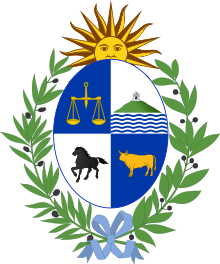Portal:Uruguay
| Portal | Participants | Templates | Tasks | Assessment | Popular Pages | Requests |
The Uruguay Portal
Uruguay (/ˈjʊərəɡwaɪ/ YOOR-ə-gwy, Spanish: [uɾuˈɣwaj] ), officially the Oriental Republic of Uruguay (Spanish: República Oriental del Uruguay), is a country in South America. It shares borders with Argentina to its west and southwest and Brazil to its north and northeast, while bordering the Río de la Plata to the south and the Atlantic Ocean to the southeast. It is part of the Southern Cone region of South America. Uruguay covers an area of approximately 176,215 square kilometres (68,037 sq mi). It has a population of around 3.4 million, of whom nearly 2 million live in the metropolitan area of its capital and largest city, Montevideo. The area that became Uruguay was first inhabited by groups of hunter-gatherers 13,000 years ago. The predominant tribe at the moment of the arrival of Europeans was the Charrúa people. At the same time, there were also other tribes, such as the Guaraní and the Chaná, when the Portuguese first established Colonia do Sacramento in 1680; Uruguay was colonized by Europeans later than its neighboring countries. The Spanish founded Montevideo as a military stronghold in the early 18th century due to competing claims over the region, while Uruguay won its independence between 1811 and 1828, following a four-way struggle between Portugal and Spain, and later Argentina and Brazil. It remained subject to foreign influence and intervention throughout the first half of the 19th century. From the late 19th century to the early 20th century, numerous pioneering economic, labor, and social reforms were implemented, which led to the creation of a highly developed welfare state, which is why the country began to be known as "Switzerland of the Americas". However, a series of economic crises and the fight against far-left urban guerrilla warfare in the late 1960s and early 1970s culminated in the 1973 coup d'état, which established a civic-military dictatorship until 1985. Uruguay is today a democratic constitutional republic, with a president who serves as both head of state and head of government. Uruguay is described as a "full democracy" and is highly ranked in international measurements of government transparency, economic freedom, social progress, income equality, per capita income, innovation, and infrastructure. The country has fully legalized cannabis (the first country in the world to do so), as well as same-sex marriage and abortion. It is a founding member of the United Nations, OAS, and Mercosur. (Full article...) Selected article - The politics of Uruguay abide by a presidential representative democratic republic, under which the president of Uruguay is both the head of state and the head of government, as well as a multiform party system. The president exercises executive power and legislative power and is vested in the two chambers of the General Assembly of Uruguay. The Judiciary is independent from the executive and legislature. The Colorado and National parties have been locked in a power struggle, with the predominance of the Colorado party throughout most of Uruguay's history. The 2004 election, however, brought the Encuentro Progresista-Frente Amplio-Nueva Mayoría, a coalition of socialists, former Tupamaros, communists, social democrats, and Christian Democrats among others to power with majorities in both houses of parliament. A majority vote elected President Tabaré Vázquez. (Full article...) Selected picture - Pocitos is an upscale beach neighborhood in Uruguay's capital city, Montevideo. The neighborhood is known for its beach, Playa Pocitos, and the Rambla, or boulevard, that lies alongside it. Did you know -
CategoriesSelect [►] to view subcategories
People -Luis Alberto Suárez Díaz (Spanish pronunciation: [ˈlwis ˈswaɾes]; born 24 January 1987) is a Uruguayan professional footballer who plays as a striker for Major League Soccer club Inter Miami. Nicknamed "El Pistolero" ("The Gunman"), he is widely regarded as one of the best players of his generation and one of the greatest strikers of all time. Individually, he has won two European Golden Shoes, an Eredivisie Golden Boot, a Premier League Golden Boot and a Pichichi Trophy. He has scored over 500 career goals for club and country. Suárez began his senior club career at Nacional in 2005. At age 19, he signed for Groningen, before transferring to Ajax in 2007. There, he won the KNVB Cup and the Eredivisie. In 2011, Suárez signed for Premier League club Liverpool, and won the League Cup in his first full season. Having established a strike partnership with Daniel Sturridge, he equalled the goalscoring record for a 38-game Premier League season and won his first European Golden Shoe in 2014. That summer, Suárez moved to Barcelona in a transfer worth £64.98 million (€82.3 million adjusted for inflation), making him one of the most expensive players of all time. (Full article...) General imagesThe following are images from various Uruguay-related articles on Wikipedia.
Related portalsTopicsRecognized content
Featured articlesGood articlesAssociated WikimediaThe following Wikimedia Foundation sister projects provide more on this subject:
Award
Things you can do
Articles that need AttentionDiscover Wikipedia using portals | |||||||||||


























































